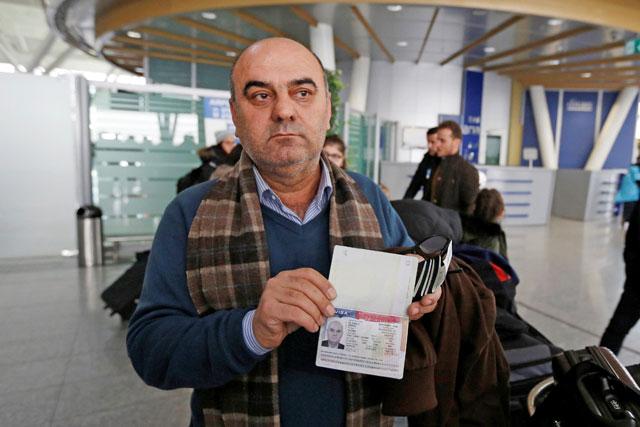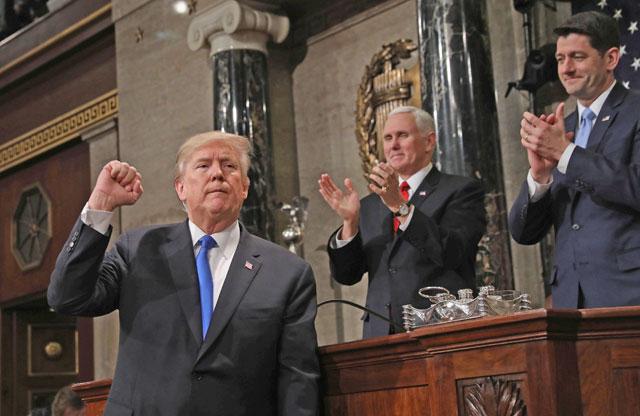You are here
Making the world less safe
By Sally Bland - Jan 05,2020 - Last updated at Jan 06,2020

Bluster: Donald Trump’s War on Terror
Peter Neumann
UK: C. Hurst & Co.
Pp. 233
Peter Neumann has impeccable credentials for writing on his topic. Currently Professor of Securities Studies at the Department of War Studies, King’s College London, he was founding director of the International Centre for the Study of Radicalisation. Hailing from Britain, he can be assumed to be above the fray of the US’s highly polarised political scene. His book builds on the debate about American counterterrorism that has raged since September 11, 2001, along two main lines: the projection of US power abroad, and America’s purported ideas and values.
Given the dramatic change that Donald Trump’s ascent to the White House heralded, Neumann’s most surprising conclusion is that in terms of actual practice, his “War on Terror” is not fundamentally different from that of preceding presidents. This was not by design, however, but because Trump came to the presidency woefully unprepared, seemingly uninterested in informing himself about pertinent matters, and having failed to work out specific policies or acquire adequate staff to implement his campaign promises. While Trump’s counterterrorism doctrine can be summarised as “killing terrorists” and “keeping Muslims out of the country”, there were not enough qualified “true believers” he could appoint to carry out his ideas. Rather, military and national security officers inherited from previous administrations — “the generals” — have continued to do their jobs in much the same way they had been, based on experience.
The real change wrought by Trump is his systematic conflation of terrorism, immigration, and Islam, resulting in the “Muslim travel ban”, the most significant policy application of his doctrine. This opened the controversy about American values, challenging the idea of America as an ethnically and religiously diverse nation of immigrants. Neumann contends that the ban had less to do with countering terrorism than with mobilising people’s fear “as part of an ideologically-driven effort to ‘break’ the mainstream consensus on immigration, and promote a different, less ‘exceptional’ and more aggressively nationalist idea of America—‘America First’” .(p. 8)
“[N]one of Trump’s ideas on immigration were feasible or made Americans safer from terrorism. The reason was simple: immigration was not the main problem, and existing systems for vetting immigrants worked as well as they could.” (p. 75)
To his credit, Neumann points out that the consensus on America as an ethnically and religiously diverse nation of immigrants is contrary to most of the country’s history. On the other hand, he states that neither Barak Obama nor George W. Bush linked terrorism with Islam, which is correct concerning Obama but not Bush
Another striking difference is Trump’s “enthusiastic support for torture. Unlike Obama, who opposed torture as a matter of principle, and Bush, who defended it as a last resort, Trump embraced torture as a form of ‘payback’ and punishment”. (p. 19)
Neumann traces Trump’s evolution from his time as a real estate dealer and reality TV star in the 1980s. While his insistence on presenting America as a nation being taken advantage of and
his suspicion of international cooperation were there from the start, his open hostility toward Muslims began only in 2011, when he hooked up with racist ideologue Steve Bannon and the “birther movement” which contended, without evidence, that Obama was a Muslim and not born in the US. Neumann sees Trump’s core beliefs as harking back to Andrew Jackson, US President from 1829-1837, who advocated bold military aggression to solve conflicts, and was reluctant to engage with the outside world and suspicious of outsiders.
On this background, Neumann analyses Trump’s campaign strategy that was based on outrage and fear, his relation with the media, and his difficulties in staffing his administration with competent “true believers”, leading him to rely on “know-nothings” like his son-in-law, Jared Kushner, and fringe groups like the far-right Centre for Security Policy, which, inter alia, had promoted the idea that the Obama Administration was infiltrated by the Muslim Brotherhood.
The book covers the imposition and repercussions of the “Muslim ban”, changes in the rules of engagement for military operations in a more aggressive direction with less concern about harming civilians, the campaign against ISIS, marginalisation of the State Department, erratic decisions that were soon contradicted, enhanced relations with “strongman” regimes, and on the domestic scene, empowering the far-right and hate crimes, and alienating Muslim communities.
The book concludes that Trump’s policies have not made Americans or the world safer due to their corrosive effects on allies, and the fact that his rhetoric and the actions he advocates call into question American values and thus feed directly into jihadists’ propaganda. “Far from promoting stability, Trump’s foreign policy has resulted in a vacuum of global leadership and greater opportunities for terrorist groups to gain support, take advantage of violent conflicts, and find safe havens… While much of his War on Terror has been bluster, its effect has been to leave Americans and the world more exposed to terrorist threats.” (pp. 115, 158)
However, in Neumann’s view, the greatest risk posed by Trump’s leadership is that it could draw the US into a direct military confrontation with Iran. The events of the past week make this risk dangerously evident.
Related Articles
AMMAN — While Jordanians expressed “shock” over Donald Trump’s win in the US presidential election, they doubted that a Hilary Clinton admin
BAGHDAD/CAIRO — A global backlash against US President Donald Trump's immigration curbs gathered strength on Sunday as several countries inc
WASHINGTON — President Donald Trump appealed on Tuesday for national unity and strong borders in his first State of the Union address, calli


















